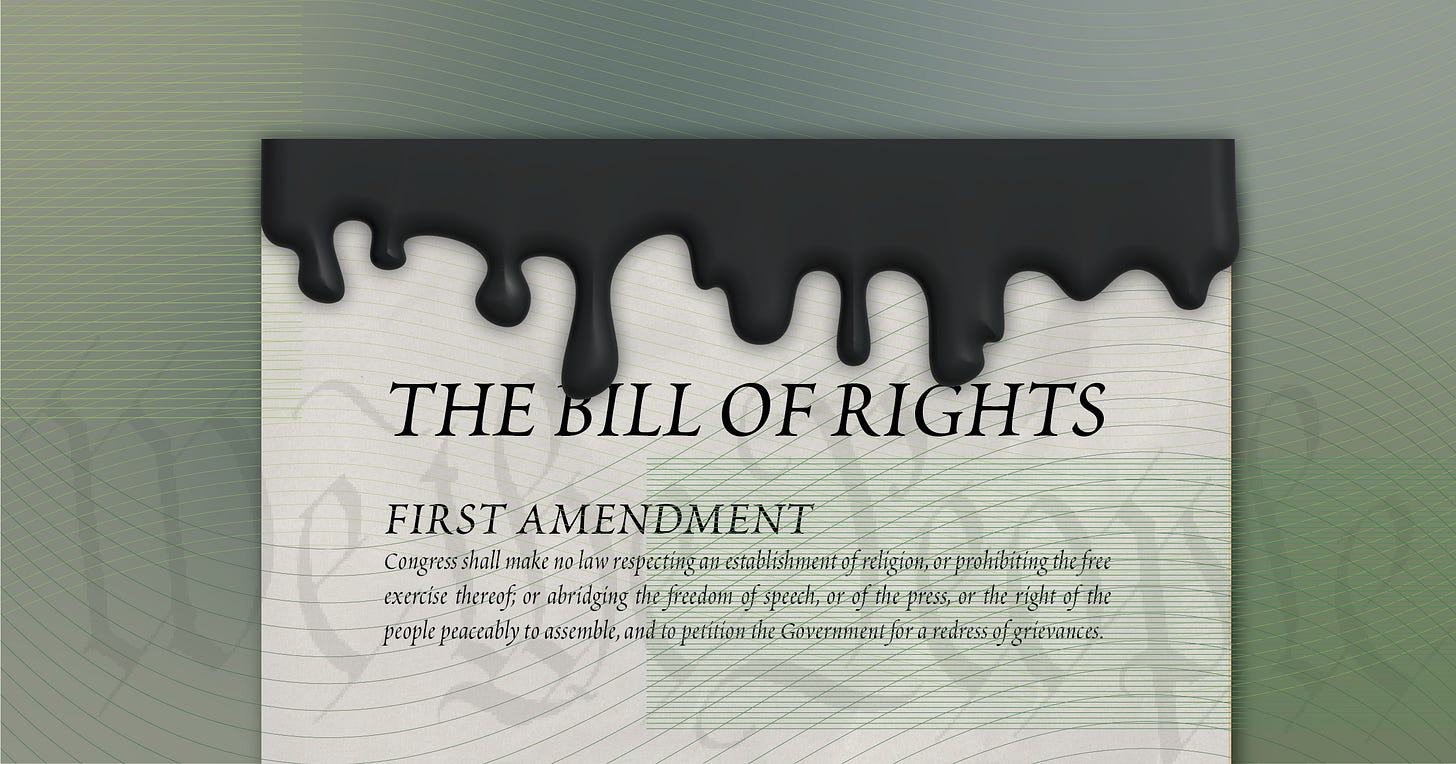Big Oil’s false advertising is not free speech
Oil and gas majors have failed so far to thwart climate liability cases using the First Amendment — and the law still isn’t on their side, a new paper argues.
Emily Sanders is the Center for Climate Integrity’s editorial lead. Catch up with her on Twitter here.
“Big Oil peddled the big lie,” U.N. Secretary General Antonio Guterres said last week following the release of a new study showing Exxon’s acute scientific understanding of climate change preceded its public denial. Facing ever-mounting evidence of their climate deception, and lawsuits seeking to hold them accountable, major fossil fuel companies are clinging to one last-ditch defense: it was all protected free speech.
But does the First Amendment actually shield companies’ commercial public speech from liability, even if that speech amounted to lying about a global crisis with deadly consequences? A new article published this month in the Environmental Law Reporter by Katie Horner, a New York attorney, says it does not.
From Exxon’s attempt to dismiss a Massachusetts consumer fraud case by arguing that it’s a conspiracy to take away the corporation’s freedom of speech, to similar efforts to dismiss or move cases in Honolulu, California, and elsewhere, Big Oil has lost these efforts every time. After digging through U.S. Supreme Court precedent and other relevant cases, Horner determined that courts have “already done away” with the arguments Big Oil is making regarding protected commercial speech.
Horner cites Big Oil’s attempt to remove a case filed by Anne Arundel, Maryland, from state to federal court, in which Chevron lawyers argued that “freedom of speech is ‘most seriously implicated… in cases involving disfavored speech on important political or social issues,’” claiming that the accountability lawsuit violates their free speech on climate change, which “‘is one of the most important public issues of the day.’”
But if commercial speech is found to contain lies, the First Amendment doesn’t shield it from accountability at all, Horner concluded. “False and misleading commercial speech warrants no First Amendment protection,” Horner said. “They can be held liable for that speech.”
Fossil fuel defendants are arguing that their statements on climate change weren’t actually lies at all, but efforts to express a supposed “point of view” on an issue of public concern. In one petition asking the Texas Supreme Court to dismiss a batch of lawsuits filed by California municipalities, Exxon lawyers argued that the litigation was “intended to cleanse the public square of alternative viewpoints.” They lost that appeal — and in the state home to their company headquarters, at that.
“The idea that fossil fuel companies’ speech about their products must be protected by the First Amendment because they are linked to a matter of public debate is not true,” Horner said. This should especially be the case for an industry whose products are directly causing the issue of public debate, she added — that issue being climate catastrophe fueled by coal, oil, and gas.
The industry’s strategy to establish so-called corporate free speech dates back to the early 1960s and 1970s, according to internal company documents revealed by Amy Westervelt in The Guardian. Mobil Oil’s quest was to promote unregulated corporate advertising as a marker of functioning democracy, and hopefully eliminate the distinction between marketing and political speech altogether.
Today, companies have evolved their deceptive speech in line with rising public concern over climate change. No longer promoting outright climate denial, their greenwashing advertisements and climate pledges mislead the public into believing that they’re working on solutions, rather than causing the problem. All the while, they are carefully manipulating their language to avoid liability. A recently unearthed memo from Shell management warned employees to watch "what we are saying" so as not to "expose" the company to "further claims.”
That doesn’t mean they won’t still be held liable. “Companies should not be rewarded for the skill with which they distort the truth and disguise their deceit,” Horner wrote. Or, as the Supreme Court ruled in Donaldson v. Read Magazine back in 1948, “People have a right to assume that fraudulent advertising traps will not be laid to ensnare them.”
While weaponizing the Constitution in an effort to shield themselves, these same companies have been at the forefront of a legal crusade to strip citizens, journalists, advocacy organizations, and communities of their First Amendment rights. As I’ve written previously, fossil fuel giants are at the helm of several lawsuits (some of which have already been dismissed) seeking to intimidate and penalize their critics for speaking out.
All the more reason to believe that oil companies don’t just happen to be champions of free speech. Rather, their defense is a desperate attempt to save themselves from paying a dime for their world-altering actions. In Horner’s words, “Corporations should not be able to use the First Amendment as a get-out-of-jail-free card.”
ICYMI News Roundup
Divest Harvard Alumni Demand Ban on Research Funding From Companies With Fossil Fuel Ties
Exxon’s predictions about the climate crisis may have increased its legal peril
Shell to spend $450m on carbon offsetting as fears grow that credits may be worthless
As The World Tries To Cut Back On Fossil Fuels, Oil Companies Turn To Plastic





Awesome visual!!!!